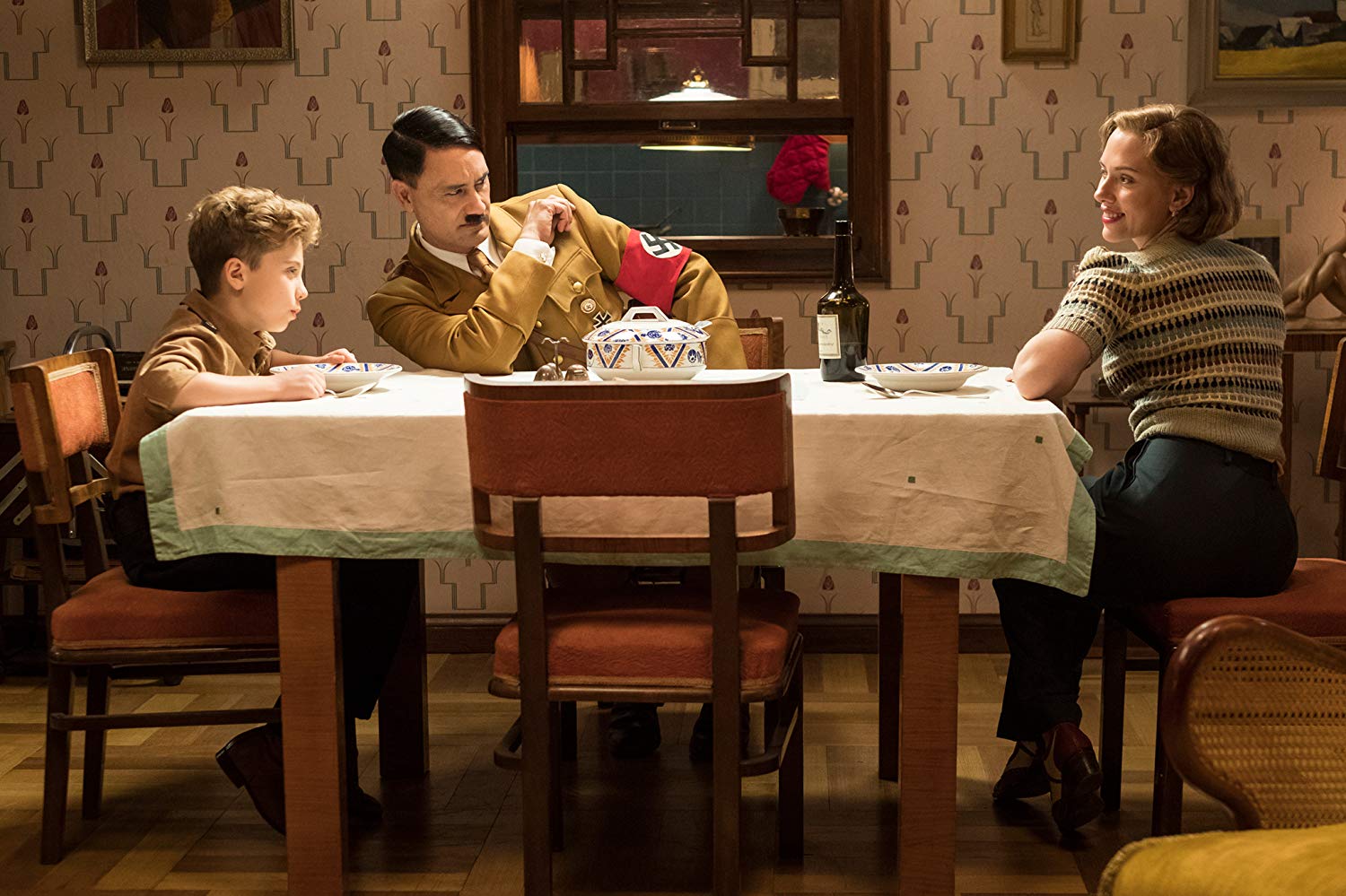Movie Info
Movie Info
- Director
- Taika Waititi
- Run Time
- 1 hour and 48 minutes
- Rating
- PG-13
VP Content Ratings
- Violence
- 3/10
- Language
- 3/10
- Sex & Nudity
- 1/10
- Star Rating
Relevant Quotes
Hear me, my God, as I voice my complaint;
protect my life from the threat of the enemy.
Hide me from the conspiracy of the wicked,
from the plots of evildoers.
They sharpen their tongues like swords
and aim cruel words like deadly arrows.
Your eyes are too pure to look on evil; you cannot tolerate wrongdoing. Why then do you tolerate the treacherous? Why are you silent while the wicked swallow up those more righteous than themselves?
Beloved, do not imitate what is evil but imitate what is good. Whoever does good is from God; whoever does evil has not seen God.

New Zealand director Taika Waititi joins Italian director Roberto Benigni’s Life is Beautiful in using comedy to depict the Nazi era, and Hitler in particular. (I should also mention Charlie Chaplin’s The Great Dictator; Ernst Lubitsch’s To Be or Not To Be; and Mel Brooks’ The Producers.) It is based on the 2004 novel Caging Skies by Christine Leunen. Not everyone is pleased with the film, but while I found it funny in many places—most notably in the sequence featuring our protagonists and four black-coated Gestapo agents that required 15 “Heil Hitlers!”—I was also deeply moved in several places, especially the underplayed scene showing the high cost of resisting Nazism. As in Life is Beautiful, Mr. Waiti affirms that Nazism and death can be synonymous.
As 10-year old Johannes “Jojo” Betzler (Roman Griffin Davis) introduces himself at the beginning of the film we see in B&W juxtaposed newsreels of Hitler being adored by rapturous crowds. His and their ardor is emphasized on the soundtrack by the Beatles’ “I Wanna Hold Your Hand,” sung in German.
The boy lives in the fictional town of Falkenheim with his mother, Rosie ( Scarlett Johansson), and the memory of his dead sister. He is donning his Hitler Youth uniform in preparation for a training camp designed to transform the boys into men, soldiers ready to kill and die for the Fuehrer, even though the backward boy cannot tie his own shoe yet without help. It is 1944, late in the war, and both boys and old men are needed to fight their encroaching enemies. His father is away at the front, and yet Jojo is not devoid of male company. Ever so often a mustached man in his tan Nazi uniform pops up to offer advice, encouragement or comment. It is none other than Adolph Hitler himself, played by the director.
At the training camp, Jojo’s only friend is the chubby Yorki (Archie Yates), almost as much a fish out of water as the sweet natured Jojo. The camp leaders are one-dimensional morons, the sloppily-uniformed Captain Klenzendorf (Sam Rockwell), always seemingly in an alcoholic daze, and his assistants, Finkel, and Fraulein Rahm (Rebel Wilson) seemingly brain-dead. Though underused, the latter has the hilarius line, spoken in support of Klenzendorf’s speech to the girls at the camp that the men’s duty is to fight and the girls task is to have babies. She chimes in, “I’ve had 18 kids for Germany.” It quickly becomes apparent to everyone that gentle Jojo is not fit for fighting when he cannot kill the rabbit the Captain hands to him for that purpose. Shamed before the assemblage, the boy runs off into the woods where his illusory Hitler re-invigorates him enough to return to the group. Rushing back where the boys are being instructed in hand grenade usage, Jojo grabs a potato masher, pulling the pin as he runs, and throws it. Just as earlier, during knife-training, a knife had bounced back into the leg of a thrower, the hand grenade bounces back to the ground where Jojo stands and explodes, thus ending his camp training.
At home the boy with a slightly scarred face and a limp is encouraged by his mother, and of course, his imaginary Hitler. But we are soon jolted from the comic by the sight of several Germans hanging from a public scaffold as mother and son walk by. Back home Jojo is startled, during one of the many periods when his mother has gone on some errand, by the discovery that someone is hiding in a storage area of the study. It is a girl, a few years older than he, Elsa (Thomasin McKenzie). “Your mother took me in. She’s kind,” she tells the surprised boy,”She treats me like a person.” To Jojo, who has swallowed whole the Nazi lies that Jewsare not persons, that they have horns and tails—even scales, he was told at camp, because they once mated with fish—her presence is a calamity. His instinct is to report her presence, but she convinces him that it would mean the arrest and death of his mother for harboring her, and possibly even himself, so he relents.
The rest of the film involves the hostility caused by the Nazi hatred slowly eroding away as they get to know each other, at least after Jojo gets over the camp-inspired desire to stab Elsa with his knife. As they begin to see the humanity in each other, Elsa also changes her view of him. “You’re not a Nazi, Jojo,” the girl says at one point. “You’re a 10-year-old boy who likes dressing up in a funny uniform.” As relations warm between the boy and girl, the influence of the imaginary Hitler on the boy decreases. In one telling scene his progress is revealed by his now being able to tie his shoe. Shoes are also involved in the boy’s sudden discovery of a tragedy that will change his life forever.
There is a touch of Catch 22 in the film’s last sequence in which the young and the old are called up to defend their town against the advancing Soviet and American forces. Jojo encounters Yorki rushing along a street of bombed buildings, the friend absurdly armed with a rocket launcher. The latter proves more a danger to the Germans than the invaders when Yorki stumbles, triggering the launch of a missile that narrowly misses his fellow townsmen on the street but blasts a large hole in a building.
Jojo tells his friend, “Nothing makes sense anymore,” and Yorki replies,” Yeah, I know, definitely not a good time to be a Nazi.” Donning a German soldier’s jacket, Jojo advances toward the sound of combat. Shortly thereafter, when American soldiers capture Jojo along with Captain Klenzendorf, his former instructor unexpectedly does something for the boy he had once despised. Something that that just might redeem his soiled soul.
The critics’ reaction to the film has been mixed, which could be expected. Many do not like the mixture of comedy and tragedy, and indeed, some almost miss the serious parts. The film does have its flaws—one of my criticisms would be that there was never an explanation of how Jojo became such an ardent Nazi when his mother Rosie was so resistant to the ideology that she took in and hid a hated Jew. Given that Scarlett Johansson is such a talented actress, her part was woefully underwritten! In the story about a college student executed by the Nazis for her resistance to Hitler, Sophie Scholl: the Final Days, we see that the girl’s devout Christian parents were among a number of Germans who managed to prevent their children from swallowing the Nazi ideology. Why had Rosie failed to teach the boy better than the Nazi lies that he replicated in his notebook filled with toxic drawings of Jews? Was it due to the father, whom we never see?
However, despite my qualms, I surrendered to the spell of the film. especially in the second half. The young actors at its center are delightful, and what they do together at the conclusion brought to my mind the music of Zorba the Greek, a reminder that even in the midst of “catastrophe” (remember Zorba’s words to Basil on the beach?) we can celebrate that life is beautiful (to bring in still another film.) The quotation just before the role of credits is icing on the cake, the poet Rainer Maria Rilke reminding us that “Beauty and terror/Just keep going/No feeling is final.” At a time when neo-Nazis have been so emboldened as to march with torches at night through an American city street and chant anti-Semitic slogans, we need films like this promoting understanding and acceptance. People of faith especially need to hearken back to the prophets and reclaim their passion for justice. Habakkuk’s question about the silence of God in the midst of evil and oppression is only partially answered in the film by the defeat of the Nazis with the arrival of Allied soldiers in Falkenheim. No film, not even Schindler’s List, could provide an answer to the question of the anguished prophet. But it can at least show that goodness can emerge from taught hatred and that just as evil has been defeated in the past, it thus will be in the future.
This review will be in the December issue of VP along with a set of questions for reflection and/or discussion. If you have found reviews on this site helpful, please consider purchasing a subscription or individual issue in The Store.

